| Srl | Item |
| 1 |
ID:
157042
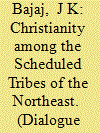

|
|
|
| 2 |
ID:
102626
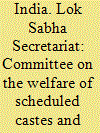

|
|
|
|
|
| Publication |
New Delhi, Lok Sabha Secretariat, 2009.
|
| Description |
8p.
|
| Series |
Parliamentary procedure abstract series; 20
|
|
|
|
|
|
|
|
|
|
|
|
Copies: C:1/I:0,R:1,Q:0
Circulation
| Accession# | Call# | Current Location | Status | Policy | Location |
| 055703 | 328.404/IND 055703 | Main | On Shelf | Reference books | |
|
|
|
|
| 3 |
ID:
161643
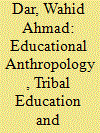

|
|
|
|
|
| Summary/Abstract |
Despite much anthropological research on education in India, the importance of educational anthropology is not properly acknowledged. This article argues for fuller recognition of educational anthropology as a helpful tool to generate well-informed grassroots research throughout India. It connects this argument to concerns that education among tribal and other marginal communities reflects problems over acceptance of diversity. Educational anthropology could help to support sustainable, people-centric educational policies, curriculum construction, and above all better-focused teacher training. Its interventions can provide cohesive glue for nurturing responsible citizenship for all Indians and would facilitate better integration of peripheral tribal communities and other minorities as responsible citizens of a huge nation that claims to be based on respect for composite culture and unity in diversity.
|
|
|
|
|
|
|
|
|
|
|
|
|
|
|
|
| 4 |
ID:
175111
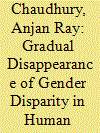

|
|
|
|
|
| Summary/Abstract |
This study examines the existence and persistence of gender disparity in education in rural and urban India. We use the sequential logit model of regression on data sets provided by three rounds of quinquennial employment and unemployment surveys conducted by the National Sample Survey Office (NSSO). The findings of the study reveal that in both rural and urban sectors of India there is gender group disparity, and this disparity is greater in the rural sector than in the urban areas. Furthermore, it is also found that the gender groups’ disparity in education in India has substantially changed during the last two decades across both sectors.
|
|
|
|
|
|
|
|
|
|
|
|
|
|
|
|
| 5 |
ID:
117925
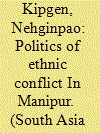

|
|
|
|
|
| Publication |
2013.
|
| Summary/Abstract |
This article analyses the conflict between the Kuki and Naga ethnic groups in the state of Manipur in North East India and attempts to understand why tensions arose in the first place and remain today between the two ethnic groups despite the formal cessation of hostilities in 1997. This ethnic conflict is shown to be a consequence of a lingering identity problem, aggravated by land disputes and equivocal responses of the state. It is argued that continued land disputes, the Nagas' unwillingness to perform Kuki customary rites and the government's indifference to the problem prevent these two groups from reaching a sustainable solution.
|
|
|
|
|
|
|
|
|
|
|
|
|
|
|
|
| 6 |
ID:
152998


|
|
|
|
|
| Summary/Abstract |
This article is an empirical investigation into the recent demands made by ethnic groups for recognition as scheduled tribes (ST) in Darjeeling. These demands emerged in the early 1990s after the publication of the Mandal Commission Report and escalated in subsequent years. During the course of this study in 2014 there were 10 ethnic groups demanding recognition as ST. In recent years the developmental strategy adopted by the state government through the constitution of development boards for groups such as Lepcha, Tamang, Sherpa, and Bhutia has caused further escalation of these demands. Discussing these multifarious issues in Darjeeling, this article traces the historical legacy of these demands and discusses in detail formation of ethnic associations and their claims in recent time. Examining the interactions between ethnic associations and government agencies, this article will provide an empirical account of ethnic politics in Darjeeling and the response of the state in containing such demands made by ethnic minorities.
|
|
|
|
|
|
|
|
|
|
|
|
|
|
|
|
| 7 |
ID:
170674
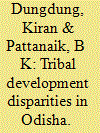

|
|
|
|
|
| Summary/Abstract |
The well-known phenomenon of tribal disadvantage in India requires constant monitoring to ensure diligent attention to equitable protection of tribal people’s right to life. This article, based on an analysis of primary data collected from 400 households in eight different tribal communities in Odisha, charts the differential progress of Odisha tribals by establishing a Tribal Development Index. Such data identify significant development disparities and confirm the existence of a ‘creamy layer’, constituted of more developed individuals and families also among India’s tribals. While many households in these eight communities still lack basic amenities, notable differences regarding food security, landholding, income and overall development were identified, supporting arguments for devising more sophisticated differential forms of intervention.
|
|
|
|
|
|
|
|
|
|
|
|
|
|
|
|
| 8 |
ID:
146876
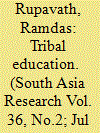

|
|
|
|
|
| Summary/Abstract |
This article critically examines initiatives for greater participation in education by tribal communities in India, arguing that current policy does not effectively enough facilitate greater participation and may, in fact, go against the avowed principle of ensuring greater equity. The article relies on fieldwork-based study to support arguments for the need to be culturally sensitive in making appropriate provisions for the education of scheduled tribes in India. Reasons for high dropout rates and non-enrolment among tribal children are examined and some searching questions are asked about why so many tribal people dislike schools.
|
|
|
|
|
|
|
|
|
|
|
|
|
|
|
|